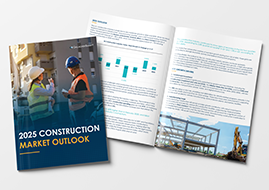
At the upcoming Workers' Compensation Institute (WCI) Annual Conference, insurance professionals from a variety of organizations and disciplines will gather to learn, network, and move the industry forward. This year's event will take place from August 17-20, 2025 in Orlando, Florida, with a number of Gallagher Bassett team members attending.
Ahead of the conference, we sat down with Irina Simpson, EVP — Workers' Compensation, to hear her thoughts on the industry's leading challenges, the opportunities available for up-and-coming talent, and the key takeaways for those who will be attending.
As the industry prepares for WCI, what are you most looking forward to at the conference, whether that be networking, listening to session panels, speaking with new talent, or a different experience?
To start, I'm certainly looking forward to the Give Kids The World volunteer event in the days leading up to the conference. Giving back is the perfect way to kick off the week, especially before we dive into industry-related conversations and learning opportunities.
Then at WCI, networking and meeting new colleagues has become a staple of the conference as it attracts risk managers, brokers, carriers, and other industry professionals. Networking is a great way for new talent to learn about the opportunities available within the industry, as well as make connections that will benefit them throughout their careers.
Finally, the sessions provide so many perspectives on a variety of topics. I'm excited to jump in and figure out how to use the insight, experience, and information I hear to inform our work at Gallagher Bassett.
What workers' compensation (WC) topics are you expecting to discuss with your industry peers, and what do you anticipate the conference's key takeaways to be?
While the frequency of claims has been down overall in the industry, we're seeing a number of signs pointing to rising severity, so I expect there will be discussions about addressing the increase of catastrophic claims, especially in key industries like construction.
I would also expect some topics centered on the evolution of medical care as it relates to catastrophic or high-severity developmental claims. These areas are affected by an injured worker's age, advancements in medicine resulting in improved survivability rates following catastrophic losses, and other contributing risk factors. For example, comorbidities such as diabetes, hypertension, or obesity will continue to influence the severity and trajectory of WC claims. We will also need to pay close attention to the evolving impact of new medications, like those popular for weight loss, on the overall claim recovery process. All said, the workforce is shifting, medicine is evolving, and the claim process is transforming with new technologies, and it's critical that we continue to evolve our approach, closely monitoring key best practices for medical care, claim handling, and injured worker advocacy to maximize outcomes and claim results.
Lastly, I'm sure we will discuss the growing focus on mental health in the workplace and as part of work-related injuries, especially as states are reassessing regulations on accepting mental injuries as compensable. We continue to be on the lookout for how these, along with many other evolving regulations, will further develop our best practices and our focus on compliance.
What do you see as the main challenges for risk managers in navigating today's WC space, and how does Gallagher Bassett help clients address them?
One of the challenges we see is the rising frequency of claims for new or low-tenured employees. Robust safety programs, pre-employment screening where possible, and ongoing training on loss control are key to minimizing this trend, especially for individuals who are newer and/or involved with heavy-duty job responsibilities. However, if or when claims do occur, early, proactive, and thoughtful intervention should be the focus for any WC program.
Providing early and effective support through clinical triage and engagement, while focusing on timely intervention, appropriateness of care, and clear pathways to recovery, will help organizations resolve claims quickly. Through early intervention, claims professionals can establish a positive rapport with a claimant at the outset, while obtaining the necessary details for the claim as they relate to co-morbidities, mental health, and behavioral and psychosocial factors.
For example, at Gallagher Bassett, tools like Clinical Concierge enable us to engage with claimants during the critical early stages of care. This engagement helps us gather information, develop a recovery plan, and build positive working relationships with injured workers.
Overall, our clients can leverage the cutting-edge technology we provide to gain data-driven insights on both an individual claim and program-wide level. Our team's expertise and commitment to service excellence enables us to act as an extension of our clients' programs and help them address today's top challenges.
With regard to attracting and retaining top talent, for professionals new to the WC space or those looking for a change, what do you want people to know about Gallagher Bassett?
I would encourage them to look for organizations that are willing and able to make significant investments in their employees. This could be reflected in how they prioritize technology, implementing advancements that allow claims professionals to focus on critical thinking rather than excessive administrative work, or how they provide support to assist their teams' time management and work experience. Additionally, look for organizations that offer opportunities for professional development, career growth options, and a strong culture that involves a balance of rewards, recognition, and opportunities to do meaningful work.
When it comes to new talent or those who are exploring career opportunities within the industry, I would say seek out the organizations that have or are developing emerging talent programs. Claims management is a very rewarding but challenging profession that requires the care of an injured worker's wellbeing, livelihood, and experience, while simultaneously working through a very complex regulatory process. Those serving in claim roles are contributing to and driving financial results for large organizations, which is an immense responsibility beyond the impact they have on people's everyday lives.
At Gallagher Bassett, we have INVEST, an emerging talent program, which provides opportunities for those new to risk, insurance, and claims management to enter our industry through a comprehensive learning and development program. It's designed to prepare participants to hold claims management positions in our organization, using a combination of adult learning principles with opportunities for skill development, application, and hands-on experience — all before their official "graduation" and becoming a resolution manager (our name for claims adjusters).
Whether this program leads to a lifelong career as a claims professional like it did for so many of us in the past or provides a launchpad into a myriad of other exciting career opportunities at Gallagher Bassett, the program is an excellent way to join our growing, global organization and become a part of how we make a difference every day.
Author
Irina Simpson
Make Gallagher Bassett your dependable partner
When making the right decision at the right time is critical to minimize risk for your business, count on Gallagher Bassett's extensive experience and global network to deliver.

